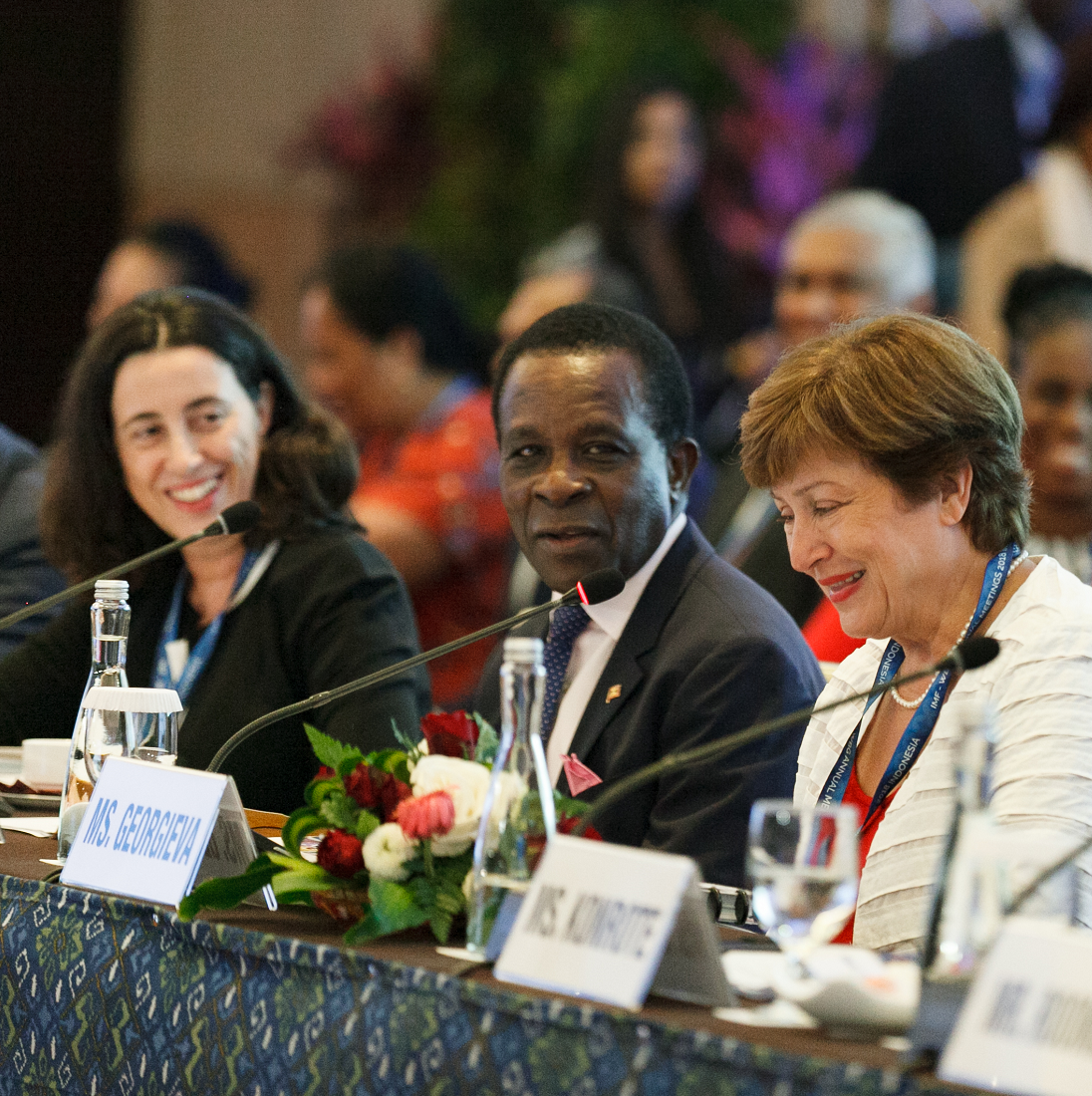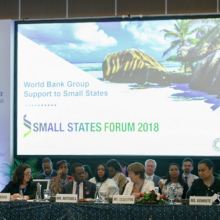Download the Chairman's Summary
Representatives of the Small States Forum (SSF) met on October 11, 2018 in Bali Indonesia on the occasion of the 2018 World Bank-IMF Annual Meetings. Members of the Forum welcomed the Chair of the SSF, Honorable Prime Minister (PM) Keith Mitchell of Grenada. The Forum also welcomed the Permanent Secretary (PS) of Fiji, Ms. Makareta Konrote, who will take over Chairmanship of the SSF from October 2018 until October 2020. Participants welcomed the World Bank Chief Executive Officer Kristalina Georgieva, key members of the WBG’s Senior Leadership Team, and development partners.
Ms. Georgieva opened the SSF by highlighting the ways in which the World Bank Group (WBG) continues to recognize the unique challenges faced by small states. Concessional financing provided by IDA is a critical part of the Bank’s support to many middle income small states, and IDA allocations for IDA-eligible small states have more than doubled in IDA18. For IBRD-eligible small states, the Bank has also doubled the base allocation and waived price increases. Ms. Georgieva noted the difficulties that small states face in absorbing these additional resources and pointed to the need to build capacity for and support to project preparation and implementation.
The SSF Chair, PM Mitchell, expressed his gratitude for the World Bank’s work on front-loading and fast-tracking IDA, noting rapid implementation in the Caribbean following the devastating hurricanes in 2017. The SSF Chair also pointed to the latest research on climate change and the corresponding urgent need for small states to invest in resilience. He noted the role of concessional finance in this regard and the need for small states to build economic resilience and to invest in ex-ante resilience measures before disasters happen.
WBG Management presented an overview of WBG support to small states. Key areas of engagement include: 1) enhancing development financing for small states through increasing volumes and access to IDA and increasing volumes and more favorable pricing of IBRD; 2) fostering private investments through existing and new platforms at IFC and MIGA; 3) supporting innovative financing mechanisms for climate and disaster response; 4) helping small states build resilience given their vulnerability to disasters and climate change and their risk of debt distress; and 5) strengthening capacity and supporting implementation on the ground.
Looking ahead, WBG management highlighted the importance of implementing the scaled-up resources to maximize development impact and sustain shareholder support and the need to address remaining gaps in the financing architecture for small states. Management will also explore how small states can tap their contribution to global public goods through, for example, their efforts to protect ocean ecosystems.
This Chairman’s summary also highlights the main issues that were raised during the technical sessions of the 2018 SSF:
1) disaster risk management in small states;
2) debt sustainability in the face of shocks; and
3) technology, innovation and connectivity: “Smart Small States”.
1. Disaster Risk Management in Small States
This session focused on the impact from climate-related weather events on small economies. The 2017 hurricane year was the most severe on record, and expectations are that the frequency and severity of weather events will continue to worsen. The key take-away is that proactive disaster management (such as early warning systems, risk pools and risk-informed planning) is critical to managing risks. In addition, after disaster hits, it is essential to ‘build back stronger, faster and more inclusively’ in order to reduce future losses.
WBG Management presented several ways in which the Bank has been working with small states on disaster risk management. In Fiji, for example, the Bank has completed a comprehensive climate vulnerability assessment which, in addition to actions that that ensure that infrastructure is made more resilient, also includes fiscal reforms and improved land planning. In Seychelles and St. Lucia the Bank has been working on climate change policy assessments which ensure that systematic resilience is built into national planning. In addition, the IDA Crisis Response Window and the Catastrophe Deferred Drawdown Option have been very important in terms of helping the response to recent storms.
2. Debt Sustainability in the Face of Shocks
This session focused on the increasing public debt levels in many small states which have been driven by a mix of growth volatility, weaker than expected fiscal consolidation, and high exposure to natural disasters and commodity price shocks. The meeting noted the importance of a strong macro framework for healthy growth and the creation of fiscal space for financing critical infrastructure and services, especially in the wake of disasters.
In addition to supporting small states on macro-fiscal policy frameworks, the WBG has committed to scaling up debt management technical assistance to help manage debt portfolios and improve capacity to monitor and analyze debt. The new debt sustainability framework takes into account the special challenges faced by small states, including tailored stress tests for natural disasters. To address the fiscal impact of climate change, the WBG is launching the climate change policy assessment which examines how fiscal policy can build resilience to climate change and natural disasters. In addition, the WBG is encouraging peer-to-peer learning, knowledge sharing and advisory support through the Climate Action Peer Exchange program.
During the discussion, the PS of Fiji described how their climate vulnerability assessment has become an important tool for informing Fiji’s national planning processes and has enabled government to quantify the potential financial impact on the economy which, from a debt sustainability and risk management perspective, is critical. Guyana’s Finance Minister, Winston Jordan, voiced the importance of building a resilient economy which depends on a strong macro fiscal framework backed up by a strong debt management strategy. The Governor of the Eastern
Caribbean Central Bank, Timothy Antoine, added that small states, together with the IMF and the Bank, could play a leading role in developing state contingent debt instruments.
3. Technology, Innovation and Connectivity: “Smart Small States”
This session focused on the role of digital technology as a source of opportunity for small states. In his capacity as lead for science and technology in CARICOM, PM Mitchell underscored the importance of connectivity for both landlocked countries and remote islands and called for a new narrative on small states as “innovative petri-dishes” which have a distinct advantage of smallness, nimbleness and speed and can innovate in areas such as fintech, the digital economy and the creative economy.
Ambassador Angus Friday of Grenada outlined key areas that would be critical for the ‘Smart Small States’ agenda including:
1) nurturing human capital and intellectual property;
2) providing infrastructure to deliver affordable high-speed connectivity;
3) building knowledge institutions;
4) accessing risk capital and developing liquid stock markets, including with support from the IFC; and
5) strengthening and clarifying regulations.
WBG Management expressed support for the focus on technology and underlined how digital development is changing the path of development through inclusion, efficiency, innovation and the creation of revenue. Technology is enabling small states to overcome the challenges of size and distance and to ‘leapfrog’ traditional development opportunities. However, many small states are still at the emerging stage of digital development in terms of infrastructure, where the cost of connectivity is still very high and the percentage of people using the internet is low.
Digital development needs to be viewed as an ecosystem that includes the creation of digital infrastructure as well as digital platforms and the skills and institutions needed for digital transformation. To this end, partnerships are critical, including with the public and private sectors, the Bank and other donors.
Conclusion
PM Mitchell expressed his appreciation for the World Bank during Grenada’s chairmanship of the SSF and welcomed Fiji as the new Chair for the next two years. The PM acknowledged the progress achieved particularly through making the Forum a market place for ideas and partnerships.
Permanent Secretary, Ministry of Economy for Fiji, Makareta Konrote, commended Grenada for advancing the discourse on many issues critical for small states such as vulnerability, de-risking, partnerships and IDA implementation. Through their leadership Fiji will endeavor to uphold the momentum and bring to the fore priorities such as oceans, climate resilience, and improving the delivery and impact of IDA.
Finally, OPCS Vice President Manuela Ferro thanked PM Mitchell for his excellent leadership of the SSF and applauded Christine Hogan, WB Executive Director for Canada, Ireland and the Caribbean, for her support at the Board. VP Ferro ended the Forum with a confirmation of the WBG’s continued commitment to small states going forward.




